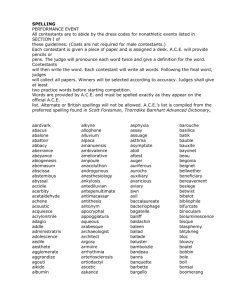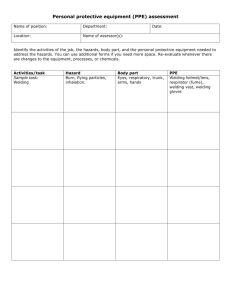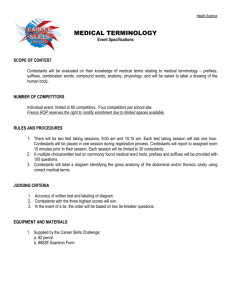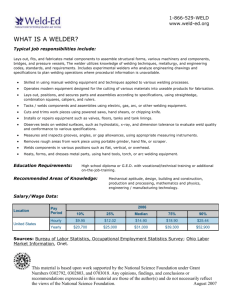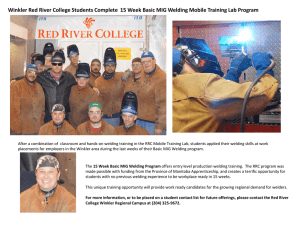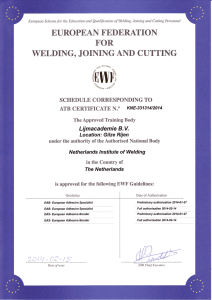State SkillsUSA competition held at DMACC FDSH took 13 Students
advertisement
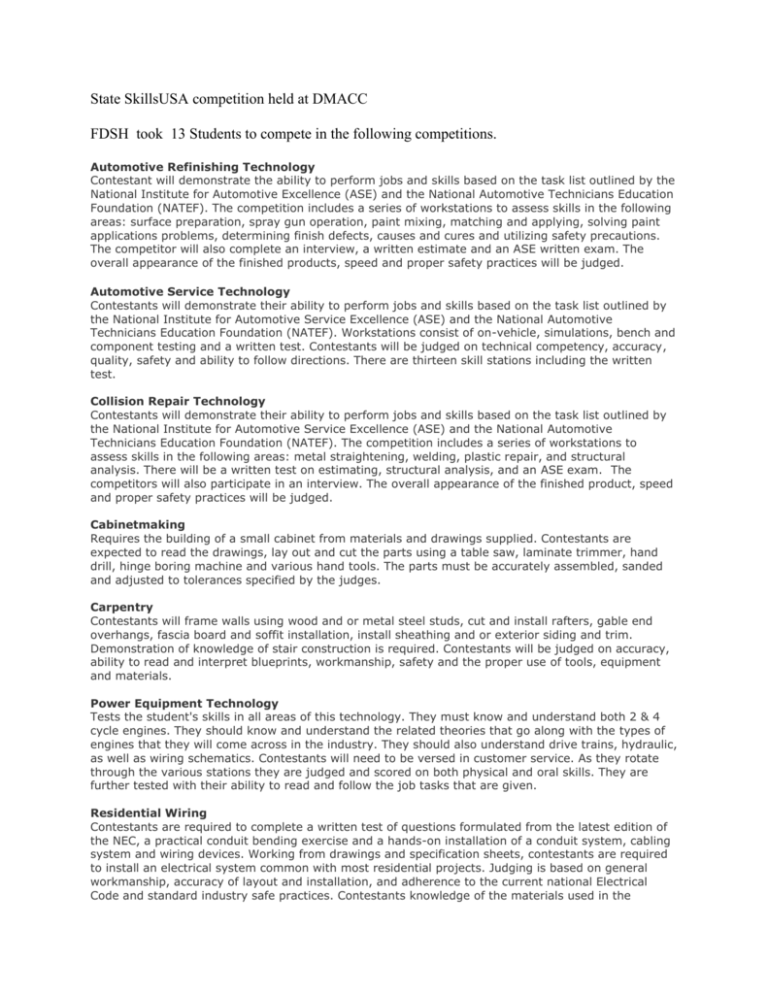
State SkillsUSA competition held at DMACC FDSH took 13 Students to compete in the following competitions. Automotive Refinishing Technology Contestant will demonstrate the ability to perform jobs and skills based on the task list outlined by the National Institute for Automotive Excellence (ASE) and the National Automotive Technicians Education Foundation (NATEF). The competition includes a series of workstations to assess skills in the following areas: surface preparation, spray gun operation, paint mixing, matching and applying, solving paint applications problems, determining finish defects, causes and cures and utilizing safety precautions. The competitor will also complete an interview, a written estimate and an ASE written exam. The overall appearance of the finished products, speed and proper safety practices will be judged. Automotive Service Technology Contestants will demonstrate their ability to perform jobs and skills based on the task list outlined by the National Institute for Automotive Service Excellence (ASE) and the National Automotive Technicians Education Foundation (NATEF). Workstations consist of on-vehicle, simulations, bench and component testing and a written test. Contestants will be judged on technical competency, accuracy, quality, safety and ability to follow directions. There are thirteen skill stations including the written test. Collision Repair Technology Contestants will demonstrate their ability to perform jobs and skills based on the task list outlined by the National Institute for Automotive Service Excellence (ASE) and the National Automotive Technicians Education Foundation (NATEF). The competition includes a series of workstations to assess skills in the following areas: metal straightening, welding, plastic repair, and structural analysis. There will be a written test on estimating, structural analysis, and an ASE exam. The competitors will also participate in an interview. The overall appearance of the finished product, speed and proper safety practices will be judged. Cabinetmaking Requires the building of a small cabinet from materials and drawings supplied. Contestants are expected to read the drawings, lay out and cut the parts using a table saw, laminate trimmer, hand drill, hinge boring machine and various hand tools. The parts must be accurately assembled, sanded and adjusted to tolerances specified by the judges. Carpentry Contestants will frame walls using wood and or metal steel studs, cut and install rafters, gable end overhangs, fascia board and soffit installation, install sheathing and or exterior siding and trim. Demonstration of knowledge of stair construction is required. Contestants will be judged on accuracy, ability to read and interpret blueprints, workmanship, safety and the proper use of tools, equipment and materials. Power Equipment Technology Tests the student's skills in all areas of this technology. They must know and understand both 2 & 4 cycle engines. They should know and understand the related theories that go along with the types of engines that they will come across in the industry. They should also understand drive trains, hydraulic, as well as wiring schematics. Contestants will need to be versed in customer service. As they rotate through the various stations they are judged and scored on both physical and oral skills. They are further tested with their ability to read and follow the job tasks that are given. Residential Wiring Contestants are required to complete a written test of questions formulated from the latest edition of the NEC, a practical conduit bending exercise and a hands-on installation of a conduit system, cabling system and wiring devices. Working from drawings and specification sheets, contestants are required to install an electrical system common with most residential projects. Judging is based on general workmanship, accuracy of layout and installation, and adherence to the current national Electrical Code and standard industry safe practices. Contestants knowledge of the materials used in the electrical industry will be tested when they are required to fill an order from a bill of material that will be used to complete the hands-on portion of this contest. Technical Drafting This contest evaluates contestant's preparation for employment and recognizes outstanding students for excellence and professionalism in the field of technical drafting. The contest will focus on the solution of industry-developed problems by applying appropriate technical drafting skills and tools including computer-aided drafting (CAD). Welding Competitors receive contest drawings and a set of welding procedure specifications. All drawings, welding symbols, and welding terms conform to the latest edition of the American Welding Society standards. Through a series of stations, contestants are tested on various aspects of welding: measuring weld replicas, using weld measuring gauges; laying out a plate and using oxy-acetylene equipment to cut several holes that are checked for accuracy and quality; Gas Metal Arc Welding (GMAW) on steel making welds in various positions using short circuiting transfers; Flux Cored Arc Welding (FCAW) using a shielding gas, making welds in various positions and, using a combination machine capable of providing the correct welding current for shielded metal arc (SMAW) and gas tungsten arc welding (GTAW). Competitors complete the steel project and weld an aluminum project in various positions using a variety of filler metals. The following State medal winners are as follows: Grant West (JR): State Champion Cabinetmaking (2nd year in a row) Aaron Haubrich(SR) State Champion Technical Drafting Grant and Aaron qualify for Nationals in Kansas City (June) 3rd Place Medalists: Joseph Walston (FR)-Technical Drafting Michael Dunba (SR)-Power Equipment Dustin Dunn (SR)- Automotive Refinishing Cody Anderson (SR)- Collision Repair Fort Dodge SkillsUSA advisors -Ed Birkey, Seth Fischer, Andrew Tew and Curtis Tessum were also recognized at the awards ceremony for their improved participation in the organization (one of four schools recognized)
